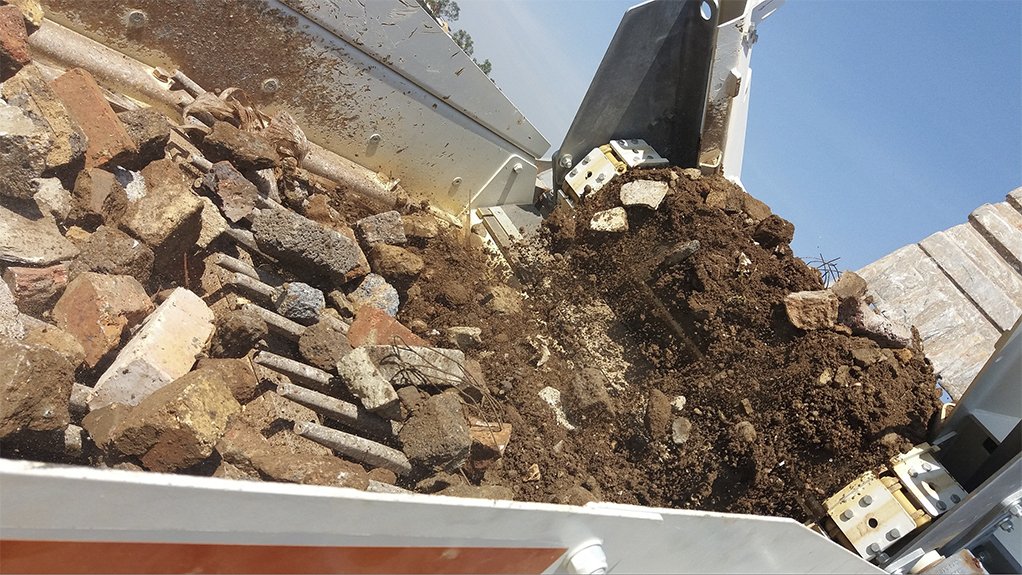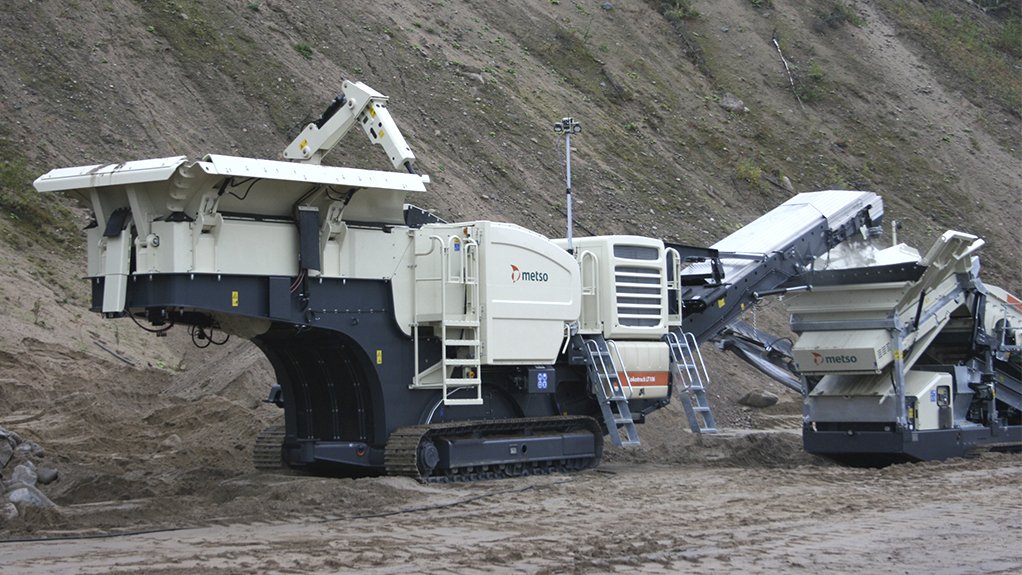Rubble recycling not seen as economically viable




FERNANDO ABELHO A lack of enforcement means much construction and demolition waste is not suitable for recycling into general aggregate
NOT ENOUGH Although recycling of construction and demolition material through crushing and screening occurs in South Africa, far more can and should be done
URBAN SOLUTION The Metso Lokotrack LT106 Urban boats up to 60% better noise protection and reduces dust emissions significantly
The recycling of construction and demolition materials in South Africa is behind the global curve, partly because it is generally not viewed as economically viable by the vast majority of local companies operating in the sector, claims crushing and screening equipment supplier Pilot Crushtec Africa sales manager Fernando Abelho.
He explains that the return on investment of construction and demolition recycling plant and equipment is a significant barrier to rubble recycling being commonplace in the country.
“For economical construction and demolition waste processing, the waste must be clean, with foreign materials removed to ensure a quality final product. A lack of enforcement on dumps means much of the construction and demolition waste is not suitable for recycling into general aggregate,” Abelho explains.
He adds that, not only are recyclers losing significant volumes of feed material, but the resulting market for their product is limited to low value filler material,” he says.
“Additionally, in some provinces, Illegal sand mining means that the cost of sand is artificially low, locking legitimate operators out of the market.”
Abelho says the only region in South Africa where construction and demolition recycling is viewed as an economically viable process and, therefore, more widely implemented, is in the Western Cape, particularly in Cape Town, where haulage distances are vast enough to financially justify additional crushing and screening of construction and demolition materials before removal.
He notes that, in general, most developed countries are “far ahead” of South Africa in terms of the legislation and implementation of construction and demolition recycling, and that South Africa would do well to improve its legislative framework and reporting structures pertaining to such recycling.
Further, increasing urbanisation means an increased need for the recycling of construction and demolition materials. Information service provider Parliamentary Monitoring Group expects urbanisation figures to reach 71% by 2030 and 80% by 2050, placing significant pressure on urban infrastructure.
This includes pressure on urban landfill sites, many of which are already reaching capacity. Moreover, space for new landfill sites is limited in highly urbanised parts of the country, most notably in the densely populated Gauteng.
Abelho says recycled construction and demolition materials could contribute to solving these challenges, as it would alleviate the current strain on landfills and help to minimise construction costs.
Crushing and screening such materials at urban landfill sites can result in less space being required if dumped in the landfill thereafter, while providing saleable recycled construction material in close proximity to most construction sites, he explains.
According to the most recent ‘South Africa State of Waste Report’, published by the then Department of Environmental Affairs in 2018, construction and demolition waste is one of the largest waste streams generated in South Africa. However, it has been largely overlooked in terms of diversion from landfill, particularly with regard to reuse and recycling.
The report notes that there is a general dearth of data on local construction and demolition waste generation rates, owing to its not being well reported in integrated waste management plans.
Moreover, the information uploaded to the South African Waste Information System is largely incomplete because many municipalities do not report it adequately or at all.
The reuse of South African construction and demolition waste is generally not well recorded either, because such waste that is destined for reuse – such as wood, ferrous and nonferrous metals, concrete, bricks, asphalt and gypsum drywall – is typically recovered at the source before haulage.
The report states that the waste is also generally used in landfills as cover material, which is done to such an extent that many landfills reduce or remove tariffs for disposing of such waste – thereby further encouraging dumping rather than reuse.
While data regarding the recycling and recovery of construction and demolition waste is limited, the report also claims that the overall recycling rate is estimated at 90% – although how this figure is determined without adequate data is not clear.
Crushing is the most widely practised form of recycling, with the report claiming that mobile and permanent crushers are in operation across the country, the majority of which are concentrated in metropolitan areas where most construction and demolition waste originates. The crushed aggregate can be used as fill or in road sub-bases.
Abelho notes that, although the recycling of construction and demolition material through crushing and screening exists in South Africa, far more can and should be done to bring the country in line with global benchmarks.
Crushing It
Mobile crushing and screening machines, such as those supplied by Pilot Crushtec, ensure that base and filler material can be processed at construction sites to reduce particle sizes, thereby reducing transport costs.
Demolished structures can be reprocessed and used in the rebuild, further providing savings by reducing the need for hauling away old material and hauling back new material.
Simply putting construction material through a primary crusher will increase the amount of material hauled per vehicle, since smaller particle sizes waste less space than large particle sizes. This can result in rubble haulage trips being reduced by up to 30%, Abelho says.
He notes that original-equipment manufacturer Metso Outotec’s Lokotrack Urban LT106 is ideal for construction and demolition material recycling in urban centres, owing to its compact size, mobility, lower dust emissions and enhanced noise-reduction capabilities.
Article Enquiry
Email Article
Save Article
Feedback
To advertise email advertising@creamermedia.co.za or click here
Comments
Announcements
What's On
Subscribe to improve your user experience...
Option 1 (equivalent of R125 a month):
Receive a weekly copy of Creamer Media's Engineering News & Mining Weekly magazine
(print copy for those in South Africa and e-magazine for those outside of South Africa)
Receive daily email newsletters
Access to full search results
Access archive of magazine back copies
Access to Projects in Progress
Access to ONE Research Report of your choice in PDF format
Option 2 (equivalent of R375 a month):
All benefits from Option 1
PLUS
Access to Creamer Media's Research Channel Africa for ALL Research Reports, in PDF format, on various industrial and mining sectors
including Electricity; Water; Energy Transition; Hydrogen; Roads, Rail and Ports; Coal; Gold; Platinum; Battery Metals; etc.
Already a subscriber?
Forgotten your password?
Receive weekly copy of Creamer Media's Engineering News & Mining Weekly magazine (print copy for those in South Africa and e-magazine for those outside of South Africa)
➕
Recieve daily email newsletters
➕
Access to full search results
➕
Access archive of magazine back copies
➕
Access to Projects in Progress
➕
Access to ONE Research Report of your choice in PDF format
RESEARCH CHANNEL AFRICA
R4500 (equivalent of R375 a month)
SUBSCRIBEAll benefits from Option 1
➕
Access to Creamer Media's Research Channel Africa for ALL Research Reports on various industrial and mining sectors, in PDF format, including on:
Electricity
➕
Water
➕
Energy Transition
➕
Hydrogen
➕
Roads, Rail and Ports
➕
Coal
➕
Gold
➕
Platinum
➕
Battery Metals
➕
etc.
Receive all benefits from Option 1 or Option 2 delivered to numerous people at your company
➕
Multiple User names and Passwords for simultaneous log-ins
➕
Intranet integration access to all in your organisation





















